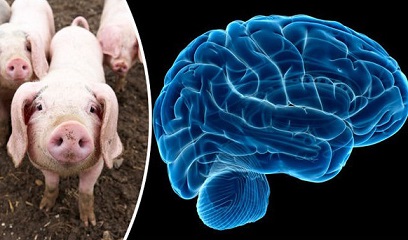Egyptian Randomized Trial Finds That Cerebrolysin (Peptides From Pig Brains) Can Treat Post-COVID-19 Olfactory, Gustatory And Chemosensory Dysfunctions!
Nikhil Prasad Fact checked by:Thailand Medical News Team May 03, 2024 11 months, 3 weeks, 1 day, 12 hours, 24 minutes ago
Long COVID News: In a groundbreaking development, researchers at Assiut University Hospital in Egypt have conducted a randomized trial showcasing the efficacy of Cerebrolysin in treating persistent post-Covid-19 smell and taste disorders. This trial comes at a crucial time when long-term effects of COVID-19 are still being understood, particularly concerning sensory impairments.
 Cerebrolysin (Peptides From Pig Brains) Can Treat Post-COVID-19
Cerebrolysin (Peptides From Pig Brains) Can Treat Post-COVID-19
Olfactory, Gustatory And Chemosensory Dysfunctions
Background of the Study
The primary objective of this randomized clinical trial was to assess the outcomes of treating post-COVID-19 olfactory and gustatory dysfunctions using Cerebrolysin, a neurotrophic factor (NTF), in combination with olfactory and gustatory trainings.
The study enrolled 250 patients, with an almost equal gender distribution (male = 93, female = 157) and an average age of 31.3 ± 8.9 years.
Research Design and Methods
This prospective randomized trial divided the participants into two groups: group 1 (n = 150) received Cerebrolysin [5 ml/d (IM), 5d/week] along with olfactory and gustatory trainings, while group 2 (n = 100) only underwent the trainings. The treatment duration spanned from 8 to 24 weeks.
Results of the Study
The study revealed that the majority of patients (66.8%) developed parosmia within months after experiencing anosmia, with the average duration of disorders being 11.7 ± 3.7 months. Objective testing confirmed anosmia in all participants and identified taste, flavor, and trigeminal sensory losses in 18% of the cohort.
Outcome Measures Analysis of the secondary outcomes focused on 202 patients (group 1 = 130; group 2 = 72). The results indicated a significant difference in recovery rates between the two groups. In group 1, which received Cerebrolysin along with trainings, 61.5% experienced complete recovery, and 17% showed partial recovery. In contrast, no recovery was observed in the group that underwent practiced olfactory and gustatory trainings alone.
Conclusions and Implications
The findings from this trial suggest that Cerebrolysin had a rapid, promising, and sustained effect in treating post-COVID-19 olfactory and gustatory dysfunctions. The cure rate exceeded 60%, showcasing the potential of Cerebrolysin in addressing these challenging sensory impairments. This efficacy is attributed to Cerebrolysin's ability to initiate and enhance neuronal regeneration and reorganization of sensory epithelia.
The study findings are important as numerous studies, cases reports and
Long COVID News coverages have shown that many people are suffering from a variety of Post-COVID-
19 issues including persistent olfactory, gustatory and chemosensory dysfunctions and there are no cures or effective treatments to date for these conditions.
Future Directions
The results of this trial pave the way for further exploration of Cerebrolysin as a treatment option for post-viral sensory impairments. Future research could delve deeper into the mechanisms underlying Cerebrolysin's efficacy and potentially optimize treatment protocols for better outcomes.
In conclusion, the Egyptian randomized trial underscores the significance of Cerebrolysin in addressing post-Covid-19 olfactory and gustatory dysfunctions, offering hope to individuals grappling with these lingering effects of the pandemic.
The study findings were published in the peer reviewed journal: Expert Review of Clinical Pharmacology (Taylor & Francis).
https://www.tandfonline.com/doi/full/10.1080/17512433.2023.2282715
About Cerebrolysin
Cerebrolysin, also known by its developmental code name FPF-1070, is a mixture of enzymatically treated peptides derived from pig brains. It contains essential neurotrophic factors such as brain-derived neurotrophic factor (BDNF), glial cell line-derived neurotrophic factor (GDNF), nerve growth factor (NGF), and ciliary neurotrophic factor (CNTF). While research on Cerebrolysin's efficacy extends to various neurodegenerative disorders, including vascular dementia, its role in post-Covid-19 sensory dysfunctions marks a promising frontier in its therapeutic potential.
https://en.wikipedia.org/wiki/Cerebrolysin
https://www.mims.com/thailand/drug/info/cerebrolysin
https://www.alzdiscovery.org/cognitive-vitality/ratings/cerebrolysin
Note: It was not known if the researchers who were Muslims or if the participating patients were aware that Cerebrolysin was made from peptides found in the brain of pigs. Most individuals from Egypt are Muslims and pigs and any parts or extracts from pigs are considered as not halal but rather haram(forbidden) according to their religious beliefs!
For the latest
Long COVID News, keep on logging to Thailand Medical News.
